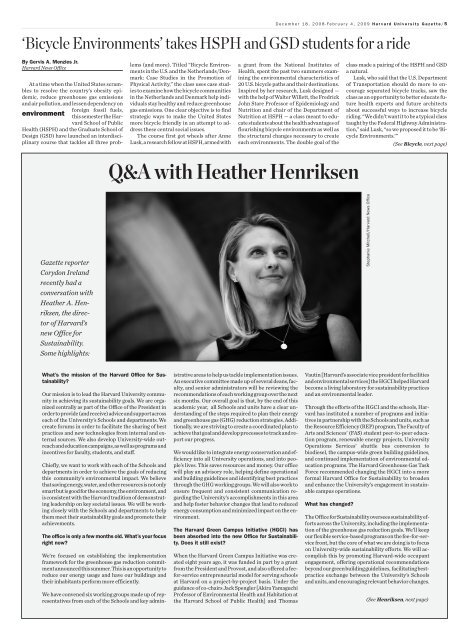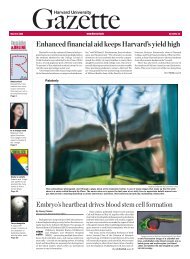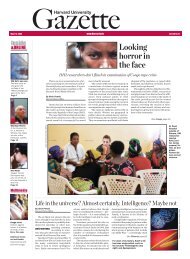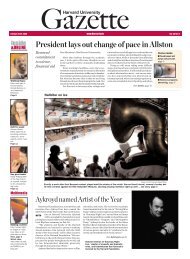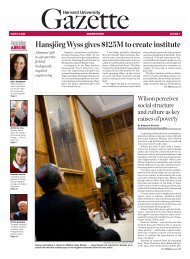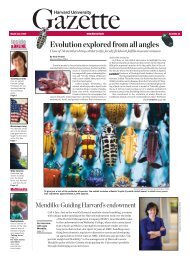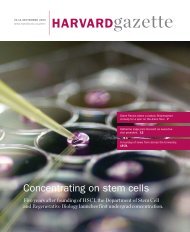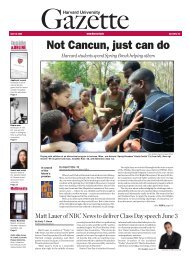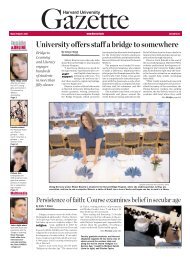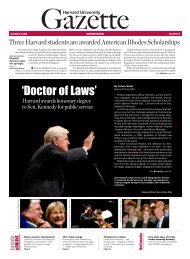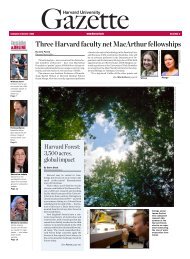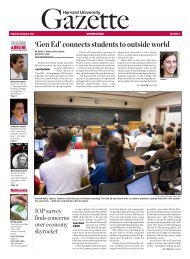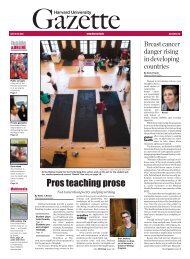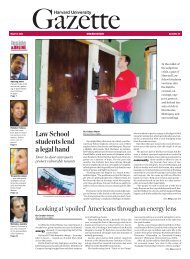4 / <strong>Harvard</strong> University Gazette December 18, 2008-February 4, 2009Algebra, topology expert Lurie named professor of mathematicsBy Steve BradtFAS CommunicationsMathematician Jacob Lurie, whose expertiseranges across algebraic geometry, topology, and algebra,has been named professor of mathematics in<strong>Harvard</strong> University’s Faculty of Arts and Sciences,effective July 1, 2009.Lurie, 31, was previously associateprofessor of mathematics at theMassachusetts Institute of Technology (MIT), a positionhe has held since 2007.“Professor Lurie is a mathematician of impressivebreadth and energy,” says Jeremy Bloxham, dean ofscience in FAS. “He is also an enthusiastic and committedteacher of mathematics, known for the clarityof his lectures. Given his dynamism and his broadexpertise, I expect that his impact on our undergraduatemathematics concentrators will be substantial.”appointmentAlthough Lurie has published papers on logic,combinatorial game theory, and lie groups, his mostsignificant work has come in algebraic geometry,topology, algebra, and most recently, representationtheory. His recent work has been described by fellowmathematicians as “revolutionary” in its intertwiningof these fields, and his notion of topologicalmodular forms has profoundly impacted algebraictopology and homotopy theory.Lurie’s work in homotopy theory has broken newground with its deep and invigorating connectionswith algebraic geometry, topological quantum fieldtheory, geometric representation theory, quantumgroup theory, and higher algebra. His work in thisarea, regarded by his peers as both fundamental andproblem solving in nature, lays a foundation for the“right way” to view certain constructions, openingup new vistas in many of the aforementioned fields.Lurie is author of the forthcoming book “HigherTopos Theory” (Princeton University Press, 2009),whose powerful theory presents applications inmany areas of mathematics.Lurie received his A.B. in mathematics from <strong>Harvard</strong>College in 2000 and his Ph.D. in mathematicsfrom MIT in 2004. He has since been supported bya five-year American Institute of Mathematics fellowship.Prior to joining the MIT faculty in 2007 hehad been a visiting professor at both <strong>Harvard</strong> andMIT.As a teen, Lurie received a gold medal in the 1994International Math Olympiad and took first place inthe 1996 Westinghouse Science Talent Search. As a<strong>Harvard</strong> undergraduate, he was the 2000 recipientof the Frank and Brennie Morgan Prize for OutstandingResearch in Mathematics, awarded by theAmerican Mathematical Society, Mathematical Associationof America, and Society for Industrial andApplied Mathematics.Marine squad in Iraq wears crimson, thanks to HKS, CoopBy Alvin Powell<strong>Harvard</strong> News OfficeA contact drawn by a <strong>Harvard</strong> KennedySchool (HKS) faculty member’s researchhas led to the filling of an unmet need forU.S. Marines in Iraq: <strong>Harvard</strong>-insigniagear.Linda Bilmes, an expert on governmentbudgeting and public finance and co-authorof the 2008 book “The Trillion DollarWar,” was contacted in September byCpl. Blake Lynch, posted near Ar Ramadi,Iraq. Lynch e-mailed Bilmes, a lecturer inpublic policy, to ask her about her researchinto the costs and economic ramificationsof the war.In response, Bilmes asked Lynch aboutthe availability of basic necessities for thetroops and what they might need. Lynchresponded that, though they have learnedto do without — they’re faithful to the slogan“Marines do more with less,” Lynchtold Bilmes — they’d love some <strong>Harvard</strong>-insigniaclothes to augment their government-issuedwardrobe.“During my research on the costs of the Iraq War,I discovered that despite spending $12 billion everymonth on contractors and combat, the military doesnot provide most troops in the field with basic itemslike soap and toothpaste,” Bilmes said. “Many servicemembers rely on their families and friends to sendthem these items.”Lynch sent Bilmes a short list of 10 items, andMoorcroft(Continued from previous page)merely descriptive. In response, he doveinto an effort to use mathematical approachessimilar to those used in physics tounderstand how the movement behaviorand interactions of the coyotes resulted intheir eventual distribution across the landscape.In building his model, he started with aset of movement rules for an individual coyote.He then compared the spatial distributionof coyotes across the landscape tha<strong>two</strong>uld result from those rules. The resultwas a model that was able to predict how thespatial pattern of the coyotes would changein the future.“We showed that it was possible to translatehypotheses about the movement behaviorof animals into a testable prediction,”Moorcroft said. “The movements of coyotesare influenced by the availability of food indifferent habitats, but they are also affectedFile Dominick Reuter/<strong>Harvard</strong> News Office‘I applaud the Coop for its donation of clothing to our Marines,’ LindaBilmes said. ‘This is a small way we in the <strong>Harvard</strong> community can showhow much we appreciate the sacrifice of our troops stationed in Iraq.’by avoidance responses that coyotes exhibitwhen they encounter individuals from differentpacks. We were able to use observationaldata to obtain quantitative estimatesfor these <strong>two</strong> different forms of movementbehaviors, and once we had done so we wereable to accurately predict how the spatialpattern of coyotes across the landscapewould change in response to the loss of coyotepacks.”Moorcroft received his doctorate in ecologyand evolutionary biology from Princetonin 1997 and worked as a postdoctoral fellowat the Princeton Environmental Instituteuntil 2001.It was during that time that Moorcroftbegan applying similar methods to plants,drawing up equations to explain how theproperties and dynamics of individualplants give rise to an ecosystem’s dynamics.“The mathematical approach for scalingfrom individual plants up to ecosystem dynamicsis similar to scaling from individualmovements up to the spatial distribution ofanimals on a landscape,” Moorcroft said.Moorcroft came to <strong>Harvard</strong> in 2001 as anassistant professor. He was named an associateprofessor in 2005 and professor of organismicand evolutionary biology in 2007.Today, Moorcroft runs a research groupwith four postdoctoral fellows, three graduatestudents, and a research assistant. Allbut one are working on predicting howecosystems around the globe will be affectedby climate change. Their studies span theworld, encompassing tropical forests in theAmazon and Southeast Asia, temperateforests in the eastern United States, the borealforests of Canada and Alaska, and theGreater Yellowstone ecosystem. The otherresearcher is working with the U.S. Fish andWildlife Service to apply Moorcroft’s predictivemodels of animal movement to theconservation and management of animalBilmes and her assistant, Tammy Sopp, contacted the<strong>Harvard</strong> Coop, which agreed to donate the hoodedsweatshirts, T-shirts, and shorts Lynch requested forhimself and members of his squad.“I applaud the <strong>Harvard</strong> Coop for its generous donationof clothing to our Marines,” Bilmes said. “Thisis a small way in which we in the <strong>Harvard</strong> communitycan show how much we appreciate the sacrifice ofour troops stationed in Iraq.”Lynch, reached via e-mail, said the heavier gearis needed this time of year because — despite searingheat in summer — it can get quite coldin Iraq. When he arrived in Baghdad lastJanuary, the city had just received its firstsnowfall in many years.Lynch, of Oceanside, Calif., said thesquad was excited to receive the gear lastmonth and joked they wouldn’t have timeto wash it because they were going to wearit to bed, train, and go to work.“I guess it’s true because when we receivedenemy fire the other night theymustered up just wearing their <strong>Harvard</strong>gear and weapons, even though that’s notthe required response,” Lynch said.Other members of the squad includeLance Cpl. Stephen Geib of Climax,Mich., Sgt. Evan Lewis of Sacramento,Calif., and Sgt. Larry Trampel of Virginia.Bilmes said the experience of Lynchand other soldiers in his squad reflectswhat she’s found more broadly in her research,which has highlighted the oftenunseencosts of the war.“The academic root of this effort is to understandthe ‘social costs’ of the war. These are costs that areborne by the troops and families, but not paid by government,”Bilmes said. “For example, the families ofveterans who are wounded must often give up theirjobs in order to care for a returning loved one. It turnsout that personal items are also a social cost: we sendyoung people overseas for 12 months to fight for theircountry, but they still have to buy their own sheetsand towels.”alvin_powell@harvard.edupopulations.“It’s a dynamical model, once you have ityou can make predictions about howchanges in habitat, management practices,and climate will affect populations,” Moorcroftsaid.Using data collected by Wofsy at <strong>Harvard</strong>Forest, Moorcroft has been able to show thatthe ability to quantitatively link the ecosystem-levelresponses to the dynamics andproperties of individual plants leads to improvedregional scale predictions of ecosystemdynamics. They are now engaged in asimilar exercise for the forests of the Amazonbasin in order to better predict how climatevariability and change are going to affectthe Amazon forest and the exchanges ofcarbon, water, and energy between Amazonianecosystems and the atmosphere.“That’s what other people can’t do,”Wofsy said. “He can predict very difficult-topredictsystems.”
December 18, 2008-February 4, 2009 <strong>Harvard</strong> University Gazette/ 5‘Bicycle Environments’ takes HSPH and GSD students for a rideBy Gervis A. Menzies Jr.<strong>Harvard</strong> News OfficeAt a time when the United States scramblesto resolve the country’s obesity epidemic,reduce greenhouse gas emissionsand air pollution, and lessen dependency onenvironmentforeign fossil fuels,this semester the <strong>Harvard</strong>School of PublicHealth (HSPH) and the Graduate School ofDesign (GSD) have launched an interdisciplinarycourse that tackles all three problems(and more). Titled “Bicycle Environmentsin the U.S. and the Netherlands/Denmark:Case Studies in the Promotion ofPhysical Activity,” the class uses case studiesto examine how the bicycle communitiesin the Netherlands and Denmark help individualsstay healthy and reduce greenhousegas emissions. One clear objective is to findstrategic ways to make the United Statesmore bicycle friendly in an attempt to addressthese central social issues.The course first got wheels after AnneLusk, a research fellow at HSPH, armed witha grant from the National Institutes ofHealth, spent the past <strong>two</strong> summers examiningthe environmental characteristics of20 U.S. bicycle paths and their destinations.Inspired by her research, Lusk designed —with the help of Walter Willett, the FredrickJohn Stare Professor of Epidemiology andNutrition and chair of the Department ofNutrition at HSPH — a class meant to educatestudents about the health advantages offlourishing bicycle environments as well asthe structural changes necessary to createsuch environments. The double goal of theclass made a pairing of the HSPH and GSDa natural.Lusk, who said that the U.S. Departmentof Transportation should do more to encourageseparated bicycle tracks, saw theclass as an opportunity to better educate futurehealth experts and future architectsabout successful ways to increase bicycleriding. “We didn’t want it to be a typical classtaught by the Federal Highway Administration,”said Lusk, “so we proposed it to be ‘BicycleEnvironments.’”(See Bicycle, next page)Q&A with Heather HenriksenGazette reporterCorydon Irelandrecently had aconversation withHeather A. Henriksen,the directorof <strong>Harvard</strong>’snew Office forSustainability.Some highlights:Stephanie Mitchell/<strong>Harvard</strong> News OfficeWhat’s the mission of the <strong>Harvard</strong> Office for Sustainability?Our mission is to lead the <strong>Harvard</strong> University communityin achieving its sustainability goals. We are organizedcentrally as part of the Office of the President inorder to provide (and receive) advice and support acrosseach of the University’s Schools and departments. Wecreate forums in order to facilitate the sharing of bestpractices and new technologies from internal and externalsources. We also develop University-wide outreachand education campaigns, as well as programs andincentives for faculty, students, and staff.Chiefly, we want to work with each of the Schools anddepartments in order to achieve the goals of reducingthis community’s environmental impact. We believethat saving energy, water, and other resources is not onlysmart but is good for the economy, the environment, andis consistent with the <strong>Harvard</strong> tradition of demonstratingleadership on key societal issues. We will be workingclosely with the Schools and departments to helpthem meet their sustainability goals and promote theirachievements.The office is only a few months old. What’s your focusright now?We’re focused on establishing the implementationframework for the greenhouse gas reduction commitmentannounced this summer. This is an opportunity toreduce our energy usage and have our buildings andtheir inhabitants perform more efficiently.We have convened six working groups made up of representativesfrom each of the Schools and key administrativeareas to help us tackle implementation issues.An executive committee made up of several deans, faculty,and senior administrators will be reviewing therecommendations of each working group over the nextsix months. Our overall goal is that, by the end of thisacademic year, all Schools and units have a clear understandingof the steps required to plan their energyand greenhouse gas (GHG) reduction strategies. Additionally,we are striving to create a coordinated plan toachieve that goal and develop processes to track and reportour progress.We would like to integrate energy conservation and efficiencyinto all University operations, and into people’slives. This saves resources and money. Our officewill play an advisory role, helping define operationaland building guidelines and identifying best practicesthrough the GHG working groups. We will also work toensure frequent and consistent communication regardingthe University’s accomplishments in this areaand help foster behavior changes that lead to reducedenergy consumption and minimized impact on the environment.The <strong>Harvard</strong> Green Campus Initiative (HGCI) hasbeen absorbed into the new Office for Sustainability.Does it still exist?When the <strong>Harvard</strong> Green Campus Initiative was createdeight years ago, it was funded in part by a grantfrom the President and Provost, and also offered a feefor-serviceentrepreneurial model for serving schoolsat <strong>Harvard</strong> on a project-by-project basis. Under theguidance of co-chairs Jack Spengler [Akira YamaguchiProfessor of Environmental Health and Habitation atthe <strong>Harvard</strong> School of Public Health] and ThomasVautin [<strong>Harvard</strong>’s associate vice president for facilitiesand environmental services] the HGCI helped <strong>Harvard</strong>become a living laboratory for sustainability practicesand an environmental leader.Through the efforts of the HGCI and the schools, <strong>Harvard</strong>has instituted a number of programs and initiativesin partnership with the Schools and units, such asthe Resource Efficiency (REP) program, The Faculty ofArts and Sciences’ (FAS) student peer-to-peer educationprogram, renewable energy projects, UniversityOperations Services’ shuttle bus conversion tobiodiesel, the campus-wide green building guidelines,and continued implementation of environmental educationprograms. The <strong>Harvard</strong> Greenhouse Gas TaskForce recommended changing the HGCI into a moreformal <strong>Harvard</strong> Office for Sustainability to broadenand enhance the University’s engagement in sustainablecampus operations.What has changed?The Office for Sustainability oversees sustainability effortsacross the University, including the implementationof the greenhouse gas reduction goals. We’ll keepour flexible service-based programs on the fee-for-servicefront, but the core of what we are doing is to focuson University-wide sustainability efforts. We will accomplishthis by promoting <strong>Harvard</strong>-wide occupantengagement, offering operational recommendationsbeyond our green building guidelines, facilitating bestpracticeexchange between the University’s Schoolsand units, and encouraging relevant behavior changes.(See Henriksen, next page)
- Page 1 and 2: 36/ Harvard University Gazette Dece
- Page 3: December 18, 2008-February 4, 2009
- Page 7 and 8: December 18, 2008-February 4, 2009
- Page 9 and 10: By Holly MetterFAS CommunicationsTh
- Page 11 and 12: December 18, 2008-February 4, 2009
- Page 13 and 14: Fair shows progress of humanities i
- Page 15 and 16: By Emily T. SimonFAS Communications
- Page 17: 60HarvardcelebratesThe UniversalDec
- Page 20 and 21: December 18, 2008-February 4, 2009
- Page 22 and 23: Upon the recommendation of the dean
- Page 24 and 25: December 18, 2008-February 4, 2009
- Page 26 and 27: December 18, 2008-February 4, 2009
- Page 28 and 29: December 18, 2008-February 4, 2009
- Page 30 and 31: December 18, 2008-February 4, 2009
- Page 32 and 33: December 18, 2008-February 4, 2009
- Page 34: Antarctica(Continued from page 1)Su


